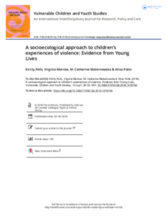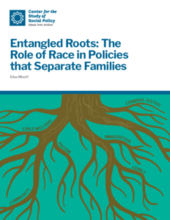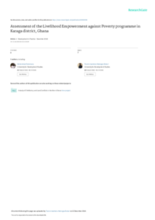Displaying 231 - 240 of 505
This paper highlights findings from a a 15-year longitudinal cohort study of children growing up in poverty in Ethiopia, India, Peru and Vietnam.
By examining the roots of policies that separate families and their entanglement with racial prejudice and discrimination, this report makes the case that we must embrace an alternative path.
This article assesses the contribution of the Livelihood Empowerment Against Poverty (LEAP) programme in reducing rural poverty in the Karaga district of Northern Ghana, using a mixed research design to compare the livelihoods of beneficiaries and non-beneficiaries.
This scoping study yielded 37 empirical studies published in peer-reviewed journals addressing one of the most pressing, sensitive, and controversial issues facing child welfare policymakers and practitioners today: the dramatic overrepresentation of Indigenous families in North American public child welfare systems.
This paper argues that to meet the needs of Aboriginal families and communities where there is child neglect, policy and practice needs to acknowledge and address the impact of trauma in shaping the lived experiences of Aboriginal people.
In this study, key predictors of trauma were examined using a multi-group analysis of a nationally representative sample of 716 child welfare involved youth ages 11–17.
This paper focuses on the role of ‘soft conditionality’ implemented through both ‘labelling’ and ‘messaging’ in evaluating the impact of the Child Grants Program in Lesotho, an unconditional cash transfer programme targeting poor households with orphans and vulnerable children.
This study examined preconception and prenatal predictors of time to first child protective services (CPS) contact among Alaska children.
This study examines the mental health of adolescents living with HIV (ALHIV) in Namibia, and the factors that contribute to mental health problems.
This is a series of briefing notes for UNICEF regional and country offices on SDG indicators. The first note summarises the development and implementation of the SDG global indicator framework and UNICEF’s role in supporting member states to collect, analyse and report on child-related SDG indicators at national and global levels.



